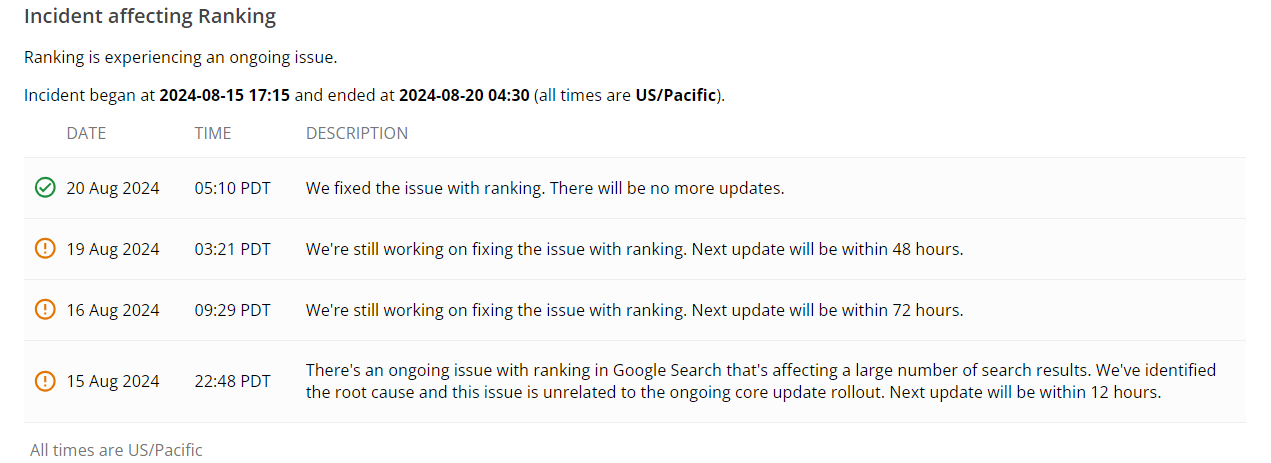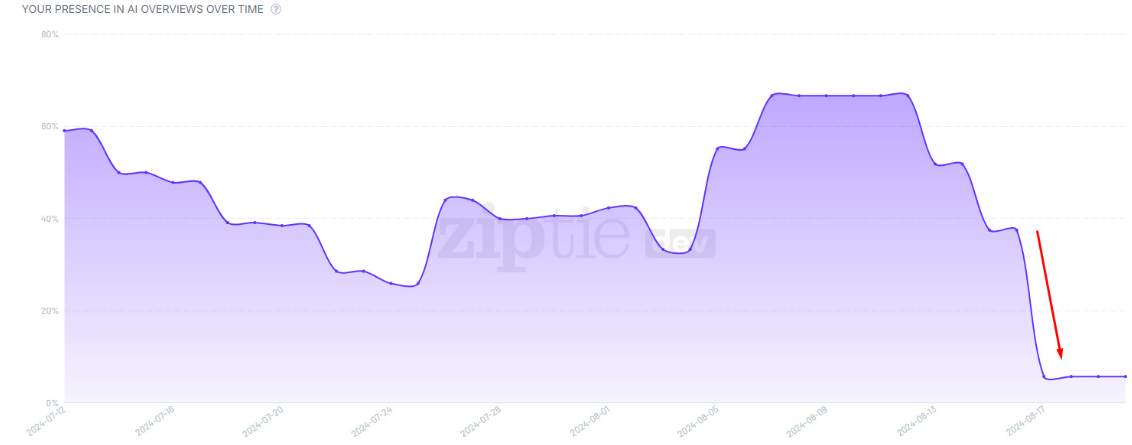Google wrapped up their August 2024 core algorithm update on September 3rd. It focuses on improving the receptiveness of their algorithms to improvements made by websites penalised by previous updates.
Does that mean this update is irrelevant if your website wasn’t hit badly in the past? Unfortunately not.
Read on to explore the update process, its impact, and what you need to do to ensure your website stays resilient in the face of these changes.
Early volatility: update or ranking bug?
Publishers reported significant ranking volatility almost immediately after rollout of the August 2024 core update began. Google quickly acknowledged the issue, reporting on August 15th that it was a bug causing these unpredictable shifts in SERP rankings — not the core update.
Google posted confirmation that the issue had been resolved five days later on August 20th. See a full timeline of their updates below.

Source: Google
This meant that the impact of the update could not be accurately measured or commented on for this period.
However, even after Google's resolution, some websites continued to report volatility in rankings and traffic in the aftermath of the bug. These fluctuations included traffic losses, unexpected gains, and unusual spikes in visibility for specific content subjects.
To add another layer of complexity, Google officially launched AI Overviews in the UK on August 15th, the same day the update began. This too could have contributed to fluctuations in traffic recorded throughout the latter half of August.
What was the August 2024 core update about?
When the ranking bug surfaced, Google was hesitant to comment on the purpose of their August core update, presumably in case the two were related.
Initially, they published the following general statement on their Search Central blog at the start of the rollout:
‘Today, we launched our August 2024 core update to Google Search. This update is designed to continue our work to improve the quality of our search results by showing more content that people find genuinely useful and less content that feels like it was made just to perform well on Search.’
Later, they added more information, announcing that the update integrates feedback from publishers gathered during creator meetings held after the March 2024 core algorithm update:
‘This latest update takes into account the feedback we've heard from some creators and others over the past few months. As always, we aim to connect people with a range of high quality sites, including small or independent sites that are creating useful, original content, when relevant to users' searches. This is an area we'll continue to address in future updates. This update also aims to better capture improvements that sites may have made, so we can continue to show the best of the web.’
Despite Google reporting that feedback received during these sessions was helpful - and that more may follow — there will be no feedback form posted for the August 2024 core update.
Why did Google need feedback?
Google’s September 2023 Helpful Content Update aimed to improve visibility for quality, original content, but in many cases — it missed the mark.
Numerous site owners complained that their websites had been penalised by the update despite containing an abundance of original content created by subject-matter experts in their niche.
Websites affected were disproportionately small in scale or independently run.
This led to sudden and widespread loss of essential income for publisher’s across the globe. Yet, in many cases, there appeared to be no rhyme or reason for such a drastic dip in visibility.
Fast-forward to early 2024 and Google is stripping the September 2023 Helpful Content update for parts and incorporating them into the impending March 2024 core update.
The September update was effectively being wiped from Google’s systems. Naturally, publishers believed that this might lead to a reversal of some of its unintended, negative effects — but no such luck.
Backlash reached fever pitch and Google decided to start listening, organising “creator meetings” to hear concerns. This is the feedback Google have supposedly worked into their latest core algorithm update.
Explore the impact of the August 2024 core update
As with any core update, Google’s latest is causing widespread ranking volatility, particularly for websites that were negatively impacted by the September 2023 Helpful Content update.
Many site owners have reported surges in visibility on the SERPs. While these are not complete recoveries to pre-HCU standings, this shows that Google has amended or backtracked on some of the criteria of the September 2023 Helpful Content update.
However, not all sites hit by the 2023 HCU have benefited.
Polls indicate that the majority have seen dips in performance, while others appear largely unaffected. This is consistent with an observation illustrating that, of 400 tracked websites - all of which still reeling from the September 2023 update - 73 have started to show signs of recovery.
To a lesser extent, sites affected by the March 2024 update are also experiencing some increases and decreases in visibility on Google’s SERPs, as are sites that were largely unaffected by previous updates.
This means that everyone should be vigilant now rollout is complete!
Keeping a close eye on performance metrics and comparing them against pre-rollout standards will help you gauge the impact of Google’s August 2024 core algorithm update. This gives you a baseline to optimise from, helping you put your best foot forward if you’ve seen any setbacks.
Map the road to recovery with TDMP
Understanding Google’s algorithm updates is a challenge in of itself; recovering visibility if you’ve been hit badly by one is harder still.
At TDMP, we specialise in helping businesses like yours understand and adapt to these changes in the digital marketing environment, ensuring your website remains competitive.
Contact us today to kickstart the recovery process.
The August 2024 core update and AI Overviews
Recently, when asked if AI Overviews are involved in core updates, Google’s John Mueller replied, “These are a part of search, and core updates affect search, so yes,”.
This relationship is evident in the changes in AI Overviews since the August update began rolling out.
According to research carried out by Glenn Gabe, sites that experienced dips in organic visibility due to the update are also seeing fewer citations in AI Overviews. You can see an example of this in action in the below report.

Source: search engine round table
This aligns with recent research showing that the majority of citations in AI Overviews are linked to websites ranking in the top 10 organic spots for relevant queries.
In other words, as your site’s ranking shifts in response to the August 2024 core update, so too will its visibility in AI Overviews.
What you need to do
With the August 2024 Core Update behind us, it’s essential to take stock of your website’s performance and strategise for the future.
Here’s our advice:
1. Don’t base changes on fluctuations during rollout:
We understand that turbulence on the SERPs is nerve-racking, and the urge to take instant action is strong.
But volatility during rollout may not reflect the long-term impact of the update, and any major changes you make may come back to haunt you.
This is particularly true of the August 2024 core update as it coincided with a ranking bug and the launch of a major SERP feature!
As John Mueller put it during a discussion on LinkedIn, ‘You’d really need to wait until the core update finishes rolling out to make any call about its effect.’
So, now that the rollout is complete, closely monitor your website’s performance using analytics tools. This will help you understand how the update has affected your site — and what actions you should take.
2. Focus on high-quality content:
Google continues to emphasise the importance of creating helpful, reliable, people-first content. While SEO is essential, the underlying goal should always be to produce content that genuinely serves your audience’s needs.
3. Don’t wait for something to go wrong to improve your website:
We recommend making a habit of improving your website and its content. Don’t wait for something to go wrong. If you’re consistently working to make your offering better for users, you lower the chances of being hit by Google’s broad core updates.
4. Be patient:
Recovery from a core algorithm update takes time. In their updated algorithm update documentation, Google states that substantial improvements may not be visible until the next update, even if you’re making lots of positive changes to your content.
5. Keep an eye on your competitors:
Competitor analysis is key following any negative impact from a core update. If competitor sites are performing well, you can pick up tips on how to recover.
If they’re also struggling, it tells you that the issue isn’t specific to your site — and there could be broader problems to address.
Worried about Google updates affecting your business? Let's talk
Google’s algorithm updates can be unpredictable, but you don’t have to navigate them alone.
Whether you’re seeing shifts in rankings or simply want to stay ahead of the game, our expert team is here to help. Contact TDMP today to discuss how we can protect and strengthen your online presence.

